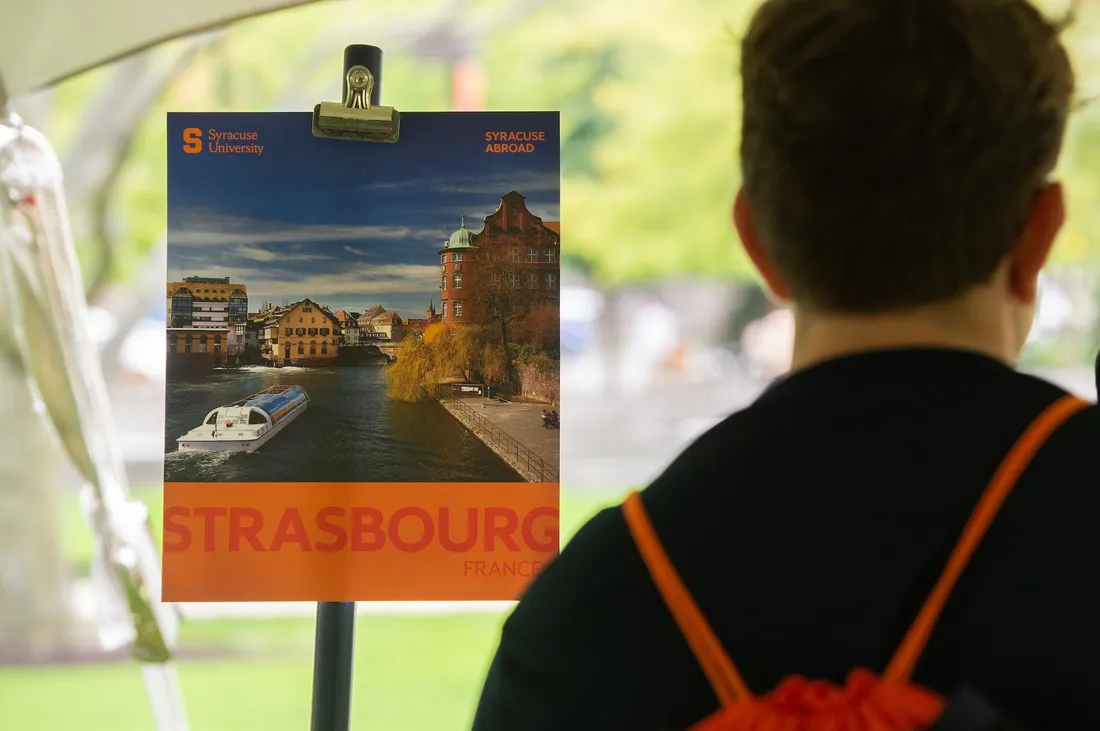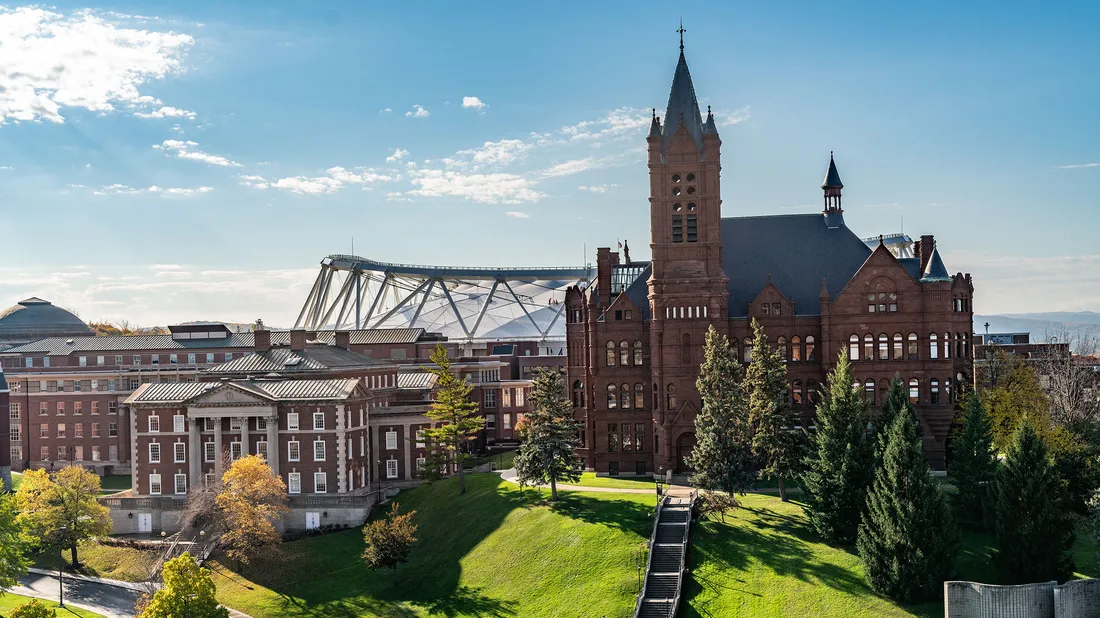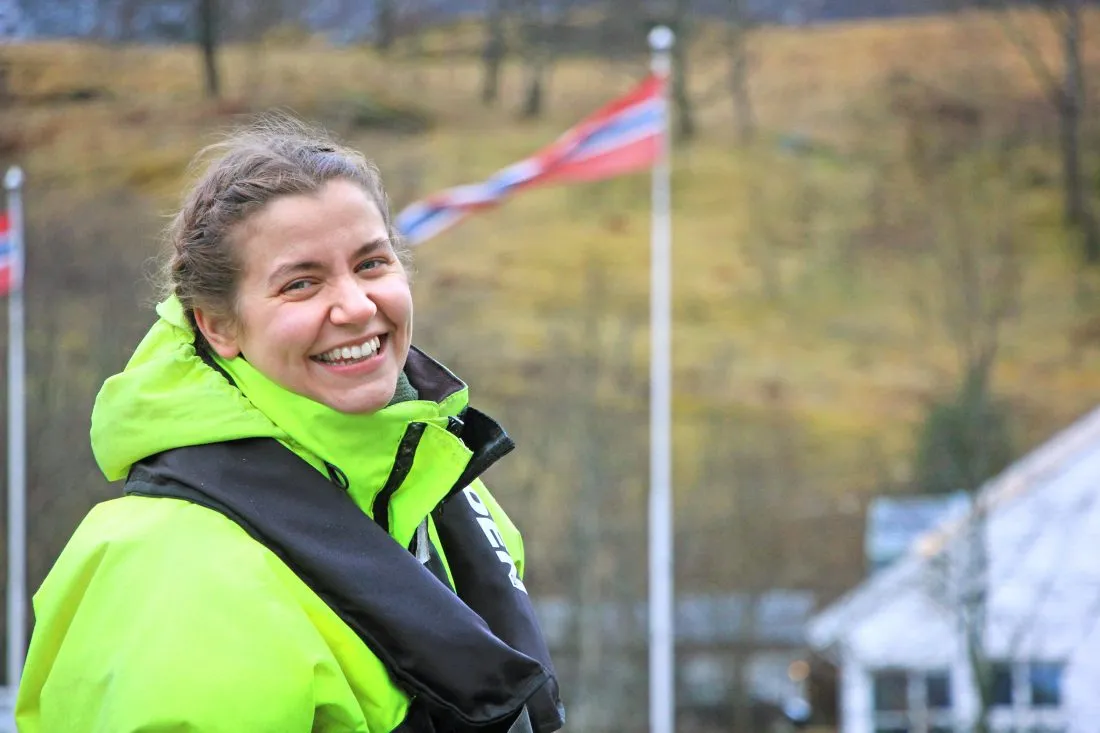
Becca Farnum, community outreach advocate and instructor at Syracuse London, on a fjord in Norway, where she travels with a seminar she teaches.
In the early dusk of a January afternoon, a string of dog sleds pulled by huskies threads swiftly through the Arctic forest. They carry 20 Syracuse University students and their instructor, Becca Farnum, who grins as the cold wind whips her hair. Although Farnum does this run every year with students enrolled in her Syracuse Abroad seminar Sustainability on Trial: Environmental Justice in Northern Europe, it never fails to fill her with elation. The experience provides a poignant moment of connection with nature and always sparks excellent class debates about animal ethics, indigenous peoples’ rights and ecotourism.
Two short months later, as the new coronavirus spread across the globe, Syracuse University’s international programming was suspended and Syracuse worked diligently to repatriate more than 1,000 students from locations around the world. At the Syracuse London center, Farnum and her colleagues worked around the clock, navigating cancelled flights and visa complications and evaluating health risks. “It’s thanks to our global reach that we were able to offer 24-hour support to students and families in the midst of enormous uncertainty, stress and turmoil,” she says.
Learning from Unprecedented Circumstances
Now that all the students are safely home and the University has transitioned to online learning, Farnum’s focus has shifted. Environmental sustainability, social justice and international relations are central themes in courses Farnum teaches, and she finds the pandemic offers a unique lens to examine issues of equity and connectivity. “Our response to COVID-19 raises so many questions about borders, identity and even the impact of business on ecosystems,” Farnum says. “This is an opportunity for meaningful conversations about students’ lived experiences of racism, debates over freedom of movement and the tension between individual rights and collective protections.”
Farnum and Karen Bennett, an adjunct professor teaching political science at the Syracuse London center, put this exploration into practice for a recent lecture for Bennett’s course Human Rights and Global Affairs. In a three-way recorded Zoom discussion with public health scholar Sarah Nakasone, they delved into the intersection of health issues with human rights, the impact of pandemics on minorities and vulnerable communities, and how catastrophes provide opportunities to imagine social justice and equity in new ways. “I am very impressed with the students’ thoughtful response to this lecture,” Bennett says. “They brought up important human rights issues and have asked excellent questions. We are still in this conversation, remotely!”
In The Global Workplace, a course on professional development with sections taught by Farnum and London's internship program manager, Maggie Scull, a final project requires students to identify a significant problem in their chosen sector and propose a viable solution. Some have elected to tackle issues revealed by COVID-19. Gokul Beeda, a fourth-year student majoring in industrial and interaction design in the College of Visual and Performing Arts (VPA), is working on the problem of preparedness. “I’m looking into how we make and manage pandemic resources in a corporate world—and what we could do better,” he says.
Personal Attention from Afar
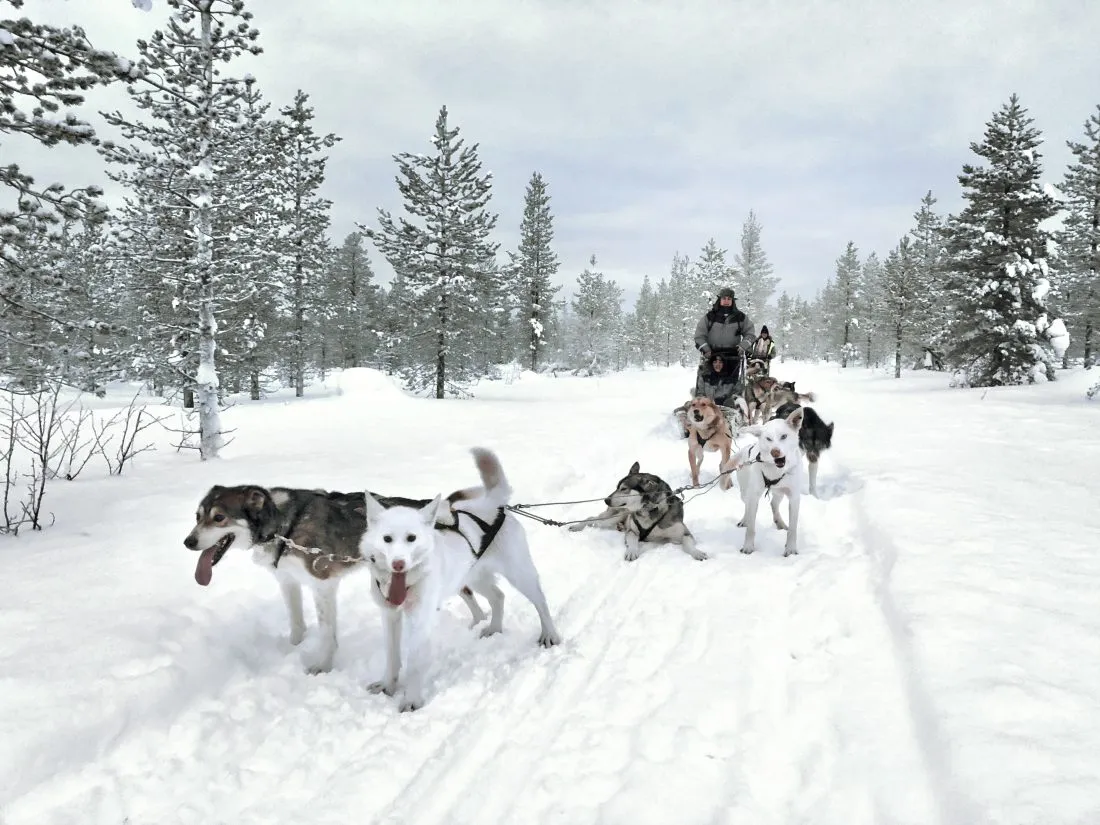
In January 2020, Syracuse Abroad students participated in a dogsled run as part of a field studies course examining sustainability and social justice in Nordic countries.
About half of the 47 students who started an internship in London this spring have been able to transfer their placement online. And working remotely has proven to have some advantages for the interns, Farnum says. Many students are getting more direct contact with their mentors than they did previously. Beeda, whose internship with a design education company in London transitioned smoothly, agrees. “The online interface, and the fact that everyone is dealing with this new situation, have made it easy to be very integrated in the team. I feel it’s given me a chance to make contributions that matter.”
Online teaching has some benefits, as well, Farnum says. Some collaborations are easier, and students are benefitting from new perspectives on the material. “Rather than one-person lectures, we’re recording discussions between professors in different fields, so we’re wrestling with topics in an interconnected, big picture context,” Farnum says.
Another benefit has been more customization and personal attention for each student. “We have more one-on-one and small group online discussions, and in lieu of exams we’re getting creative about assessment—capturing learning outcomes with reflective memos, policy briefs or visual slide decks. This offers the chance for diverse learning styles to shine,” she says.
For some students, the increase in flexibility has opened opportunities for passion projects related to their field. Though her materials-based studio internship couldn’t be completed online, Olivia McMaster, a VPA major in environmental and interior design with a minor in entrepreneurship and emerging enterprises from the Whitman School of Management, has used the class time to start organizing a fall 2020 event on sustainable design practice certifications.
A Shared Experience and Opportunities for Enrichment
Despite these positive developments, Farnum and her colleagues are keenly aware of how difficult and disappointing it has been for some students to have their London experience cut short. They quickly built Virtual London, a webpage featuring digital exhibits from iconic museums, online tours of landmarks and free streaming of British theatre classics. They also created a journal with prompts intended to help students reflect on their experience and the impact from the COVID-19 disruption. Staff, including a licensed social worker, are available for video chat check-ins. “We know many of our students are missing their abroad experience or facing challenging situations,” Farnum says. “We want them to know they’re still part of Syracuse London, wherever they are, and they have our support.”
We want [our students] to know they’re still part of Syracuse London, wherever they are, and they have our support.
Becca Farnum
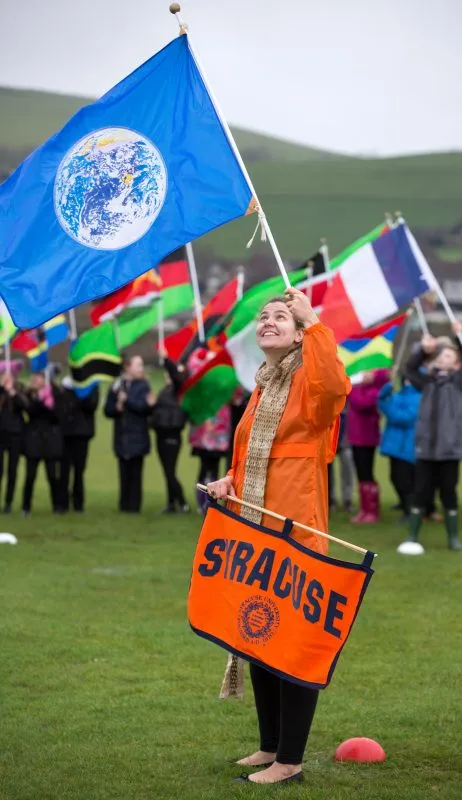
Becca Farnum in Lockerbie Scotland as part of Syracuse University’s Pan Am Flight 103 Remembrance.
Of course, it’s not only Syracuse students who have been affected by the suspension of the London program. As the community outreach advocate for Syracuse London, Farnum partners closely with groups in Lockerbie as part of the University’s Pan Am Flight 103 Remembrance. Usually, she takes a group of London students to visit the Scottish town. They spend time in local schools, tour the crash site with a first responder and host a community dinner. Since that travel is not possible, Farnum is working with teachers to create a pen pal program connecting Syracuse undergrads to students and families in Lockerbie. The new model will foster longer-term involvement and, she hopes, lasting relationships. “The goal is to give our students an opportunity to create meaningful connection while they enrich the Lockerbie students’ stay-at-home-schooling,” Farnum says.
Embracing Remote Learning Opportunities
“Everything is a learning opportunity,” Farnum says. She believes that the pandemic—and the adaptations the Syracuse community has made to create robust remote-learning educational experiences—will add value in curricula and teaching methods for the foreseeable future. Farnum is already imagining ways this experience will shape future iterations of the sustainability seminar when, once again, students will be skimming along fjords, witnessing the impact of climate change on Nordic communities, touring innovative buildings that capture and repurpose body heat and—of course—hugging huskies.
“We will be referencing the coronavirus and what it has to teach about the common good, class distinctions and resource distribution for a long time,” Farnum says. “I think we’ll emerge from this with more nuanced understandings of our collective vulnerabilities and interconnectedness. My job as a professor is to partner with students to transform this confusion into constructive knowledge and productive action.”

